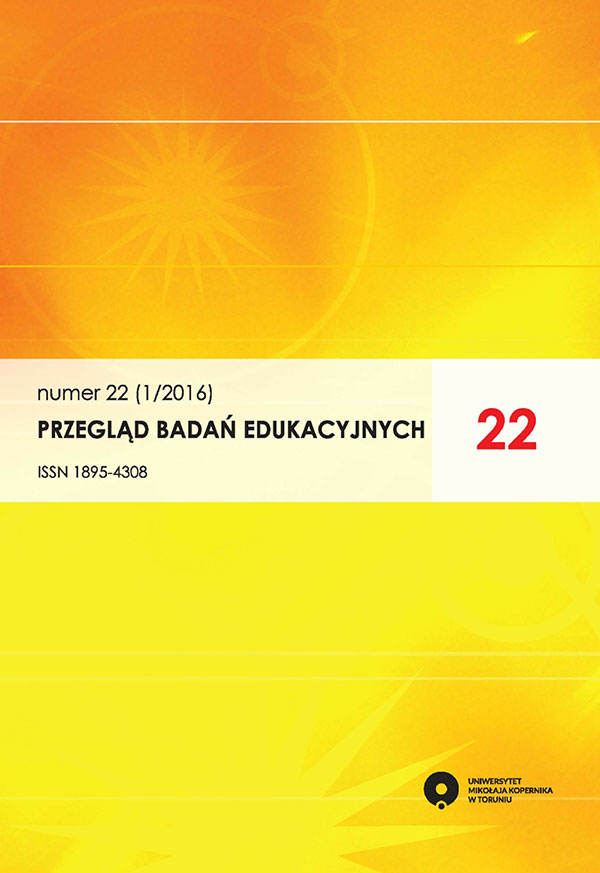Spirituality According to AQAL Model. A Contribution to Integral Education
DOI:
https://doi.org/10.12775/PBE.2015.065Keywords
spirituality, AQAL model, evolutionary spiritual development, pre/trans fallacy, level/line fallacyAbstract
The goal of the article is to analyse the phenomenon of spirituality with pointing to educational context. The question of spirituality was presented in the light of the AQAL integral meta-model. This model allows fordescribing spirituality as an internal and external dimension of existence, as levels of spiritual development, spiritual intelligence, spiritual states and types of spiritual experiences. The core issue of the AQAL model is an inclusive meta-theory on the one hand, and on the other, it is a series of inclusive practices. The results of the analysis can contribute to developing the spiritual aspect of human experience in thepractice of integral education.References
Astin A.W., Astin H. S., Wilber K. (2010), Spirituality in higher education. Pobrane z: www.integrallife.com/ken-wilber-dialogues/spirituality-higher-education, dostęp: 12.01.2016.
Bhaskar, R., Esbjörn-Hargens, S., Hedlund, N., Hartwig, M. (eds.) (2016), Metatheory for the 21st century: Critical realism and integral theory in dialogue (ontological explorations), Abingdon, Routledge, New York.
Błajet P. (2012), Od edukacji sportowej do olimpijskiej. Studium antropologiczne, Oficyna Wydawnicza „Impuls”, Kraków.
Combs A. L. (2008), Reflections on online integral education: The learning community as a vessel for transformation, “AQAL: Journal of Integral Theory and Practice”, vol. 4, no. 2, s. 2–12.
Duerr M., Zajonc A., Dana D. (2003), Survey to transformative and spiritual dimensions of higher education, “Journal of Transformative Education”, vol. 1, no. 3, s. 177–211, DOI: http://dx.doi.org/10.1177/1541344603001003002
Esbjörn-Hargens S. (2007), Integral teacher, integral students, integral classroom: Applying integral theory to graduate education, “AQAL: Journal of Integral Theory and Practice”, vol. 2, no. 2, s. 72–103.
Esbjörn-Hargens S. (2010), An overview of Integral Theory: An all-inclusive framework for the twenty-first century, w: S. Esbjörn-Hargens (ed.), Integral theory in action: Applied, theoretical, and constructive perspectives on the AQAL Model, SUNY Press, New York, s. 33–61.
Gidley J. M. (2010), Evolving higher education integrally, w: S. Esbjörn-Hargens. J. Reams, O. Gunnlaugson (eds.), Integral education: new directions for higher learning, SUNY Press, New York, s. 345–361.
Horowski J. (2010), Koncepcja integralnego, cielesno-duchowego rozwoju człowieka w ujęciu pedagogiki tomistycznej, w: P. Błajet (red.), Ciało – Edukacja – Umysł, Wydawnictwo Uczelniane Wyższej Szkoły Gospodarki, Bydgoszcz, s. 43–59.
Ingersoll R. E., Bauer A.L. (2004), An integral approach to spiritual wellness in school counseling settings, “Professional School Counseling”, vol. 7, no. 5, s. 301–308.
Kielar M. B. (2012), Integralna wizja Kena Wilbera i jej zastosowanie w edukacji, Wydawnictwo Akademii Pedagogiki Specjalnej, Warszawa.
Kielar M. B., Gop A. (2012), Integralny Pluralizm Metodologiczny, Wydawnictwo Akademii Pedagogiki Specjalnej, Warszawa.
Kielar M. B. (2015a), Idee edukacji integralnej w polskiej pedagogice, w: S. Sztobryn, K. Kamiński, M. Wasilewski (red.), Pedagogika filozoficzna, t. VI: Filozofia wychowania w Europie Środkowej w kontekście uwarunkowań historycznych, społecznych, politycznych i filozoficznych, Wydawnictwo Naukowe TPF „Chowanna”, Łódź., s. 359–376.
Kielar M. (2015b), Rozwój osób dorosłych w świetle teorii konstruktywistyczno-rozwojowej, „Pedagogika Społeczna”, nr 2, s. 53–70.
Kwieciński Z. (2013), Ku odnowie ekologii pedagogicznej, „Studia Edukacyjne”, nr 26, s. 7–18.
Sarath E. (2010), Jazz, creativity, and consciousness: A blueprint for integral education, w: S. Esbjörn-Hargens, J. Reams, O. Gunnlaugson (red.), Integral education: new directions for higher learning, SUNY Press, New York, s. 169–184.
Śliwerski B. (2010), Teoretyczne i empiryczne podstawy samowychowania, Oficyna Wydawnicza „Impuls”, Kraków.
Stróżyński M. (2010), Edukacja religijna w kontekście integralnym: zagrożenia i potencjał, w: P. Błajet (red.), Ciało – Edukacja – Umysł (s. 199–210), Wydawnictwo Uczelniane Wyższej Szkoły Gospodarki, Bydgoszcz.
Walsh R., Vaughan F. (1994), The worldview of Ken Wilber, “Journal of Humanistic Psychology”, vol. 34, no. 2, s. 6–21, DOI: http://dx.doi.org/10.1177/00221678940342002
Wilber K. (1995), Śmiertelni, nieśmiertelni, przeł. A. Biała, Wydawnictwo Jacek Santorski & Co. Wydawnictwo, Warszawa.
Wilber K. (1999), A sociable God: Toward a new understanding of religion, w: The collected works of Ken Wilber, vol. 3, Shambhala, Boston−London.
Wilber K. (2000), Sex, ecology, spirituality: The spirit of evolution, second, revised edition, w: The collected works of Ken Wilber, vol. 6, Shambhala, Boston−London.
Wilber K. (2002), Jeden smak. Przemyślenia nad integralną duchowością, przeł. H. Smagacz, Wydawnictwo Jacek Santorski i Co. Wydawnictwo, Warszawa.
Wilber K. (2006a), Introduction to integral theory and practice: IOS basic and the AQAL map, “AQAL: Journal of Integral Theory and Practice”, vol. 1, no. 1, s. 1–40.
Wilber K. (2006b), God’s playing a new game, rozm. przepr. A. Cohen. Pobrane z: http://www.andrewcohen.org/andrew/post-metaphysics.asp, dostęp: 21.01.2016.
Wilber K. (2007a), Integral spirituality: A startling new role for religion in the modern and post-modern world, Integral Books, Boston−London.
Wilber K. (2007b), The integral vision: A very short introduction to the revolutionary integral approach to life, god, the universe, and everything, Shambhala, Boston−London.
Wilber K. (2008), Małżeństwo rozumu z duszą. Integracja nauki i religii, przeł. H. Smagacz, Wydawnictwo Jacek Santorski i Co. Agencja Wydawnicza, Warszawa.
Wilber K., Patten T., Leonard A., Morelli M. (2008), Integral life practice: A 21st-century blueprint for physical health, emotional balance, mental clarity, and spiritual awakening, Integral Books, Boston−London.
Żłobicki W. (2009), Edukacja holistyczna w podejściu Gestalt. O wspieraniu rozwoju osoby, Oficyna Wydawnicza „Impuls”, Kraków.
Downloads
Published
How to Cite
Issue
Section
Stats
Number of views and downloads: 1481
Number of citations: 0



